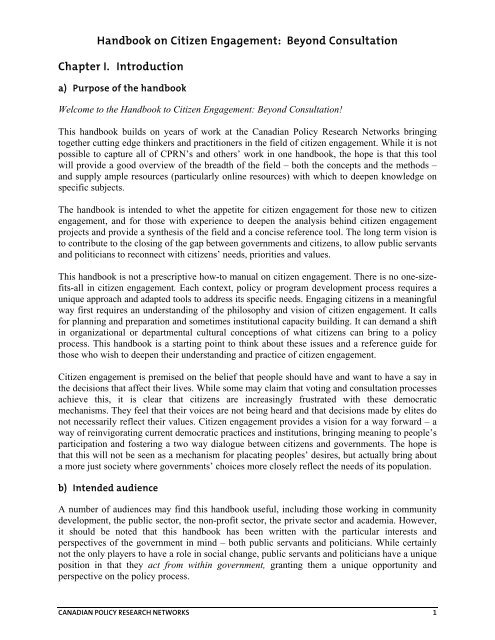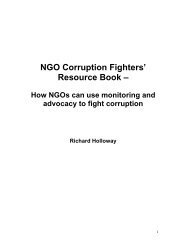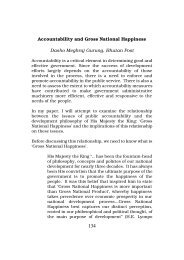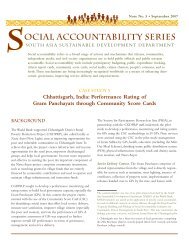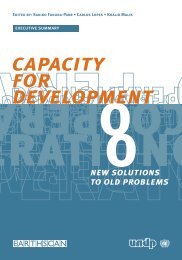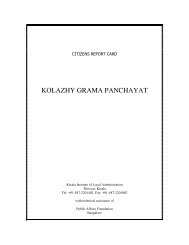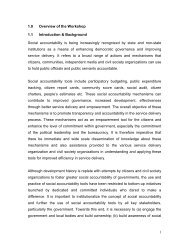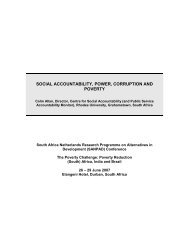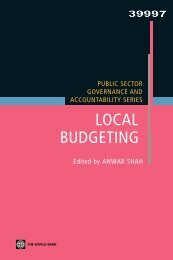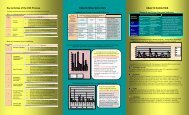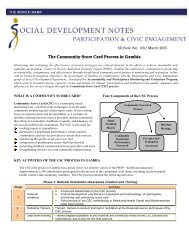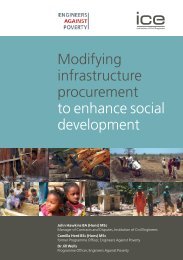Handbook on Citizen Engagement: Beyond Consultation - SASANet
Handbook on Citizen Engagement: Beyond Consultation - SASANet
Handbook on Citizen Engagement: Beyond Consultation - SASANet
- No tags were found...
You also want an ePaper? Increase the reach of your titles
YUMPU automatically turns print PDFs into web optimized ePapers that Google loves.
<str<strong>on</strong>g>Handbook</str<strong>on</strong>g> <strong>on</strong> <strong>Citizen</strong> <strong>Engagement</strong>: Bey<strong>on</strong>d C<strong>on</strong>sultati<strong>on</strong>Chapter I. Introducti<strong>on</strong>a) Purpose of the handbookWelcome to the <str<strong>on</strong>g>Handbook</str<strong>on</strong>g> to <strong>Citizen</strong> <strong>Engagement</strong>: Bey<strong>on</strong>d C<strong>on</strong>sultati<strong>on</strong>!This handbook builds <strong>on</strong> years of work at the Canadian Policy Research Networks bringingtogether cutting edge thinkers and practiti<strong>on</strong>ers in the field of citizen engagement. While it is notpossible to capture all of CPRN’s and others’ work in <strong>on</strong>e handbook, the hope is that this toolwill provide a good overview of the breadth of the field – both the c<strong>on</strong>cepts and the methods –and supply ample resources (particularly <strong>on</strong>line resources) with which to deepen knowledge <strong>on</strong>specific subjects.The handbook is intended to whet the appetite for citizen engagement for those new to citizenengagement, and for those with experience to deepen the analysis behind citizen engagementprojects and provide a synthesis of the field and a c<strong>on</strong>cise reference tool. The l<strong>on</strong>g term visi<strong>on</strong> isto c<strong>on</strong>tribute to the closing of the gap between governments and citizens, to allow public servantsand politicians to rec<strong>on</strong>nect with citizens’ needs, priorities and values.This handbook is not a prescriptive how-to manual <strong>on</strong> citizen engagement. There is no <strong>on</strong>e-sizefits-allin citizen engagement. Each c<strong>on</strong>text, policy or program development process requires aunique approach and adapted tools to address its specific needs. Engaging citizens in a meaningfulway first requires an understanding of the philosophy and visi<strong>on</strong> of citizen engagement. It callsfor planning and preparati<strong>on</strong> and sometimes instituti<strong>on</strong>al capacity building. It can demand a shiftin organizati<strong>on</strong>al or departmental cultural c<strong>on</strong>cepti<strong>on</strong>s of what citizens can bring to a policyprocess. This handbook is a starting point to think about these issues and a reference guide forthose who wish to deepen their understanding and practice of citizen engagement.<strong>Citizen</strong> engagement is premised <strong>on</strong> the belief that people should have and want to have a say inthe decisi<strong>on</strong>s that affect their lives. While some may claim that voting and c<strong>on</strong>sultati<strong>on</strong> processesachieve this, it is clear that citizens are increasingly frustrated with these democraticmechanisms. They feel that their voices are not being heard and that decisi<strong>on</strong>s made by elites d<strong>on</strong>ot necessarily reflect their values. <strong>Citizen</strong> engagement provides a visi<strong>on</strong> for a way forward – away of reinvigorating current democratic practices and instituti<strong>on</strong>s, bringing meaning to people’sparticipati<strong>on</strong> and fostering a two way dialogue between citizens and governments. The hope isthat this will not be seen as a mechanism for placating peoples’ desires, but actually bring abouta more just society where governments’ choices more closely reflect the needs of its populati<strong>on</strong>.b) Intended audienceA number of audiences may find this handbook useful, including those working in communitydevelopment, the public sector, the n<strong>on</strong>-profit sector, the private sector and academia. However,it should be noted that this handbook has been written with the particular interests andperspectives of the government in mind – both public servants and politicians. While certainlynot the <strong>on</strong>ly players to have a role in social change, public servants and politicians have a uniquepositi<strong>on</strong> in that they act from within government, granting them a unique opportunity andperspective <strong>on</strong> the policy process.CANADIAN POLICY RESEARCH NETWORKS 1


